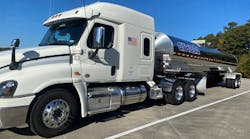CarriersEdge, providers of online safety and compliance training tools for the North American transportation industry, announced a new suite of driver wellness courses. Offered in three modules, the courses can be used as an extension to an existing wellness program, or as a starting point so fleets can educate drivers about how to stay healthy on the road.
“CarriersEdge is now offering a way for fleets to begin or enhance a wellness program,” said Jane Jazrawy, chief executive officer of CarriersEdge. “Wellness initiatives are definitely needed by transportation companies and their drivers. Obesity, sleep apnea, and Type 2 diabetes are common among truck drivers. Wellness initiatives can improve a driver’s well-being and quality of life. With our Wellness Courses, companies can prevent losing drivers due to medical reasons by helping them stay healthier.”
The new CarriersEdge Driver Wellness courses addresses the three cornerstones to promoting good health: diet, exercise, and proper amount of sleep. Recognizing that it can be challenging for truck drivers to accomplish these goals, CarriersEdge developed a suite of modules that address these issues, which can negatively affect a driver's health and the ability to stay on the road. The courses focus on providing an understanding of how the human body responds to fatigue, finding ways to eat healthy, and get exercise on the road.
The following modules can be taken individually or as one comprehensive course:
Fatigue--Considered just as dangerous as driving while impaired, this module helps drivers recognize the signs of fatigue and get more rest when they’re on the road. Discussions include how to recognize the signs of fatigue, the effects of "sleep debt" and evaluating how well you sleep, and how to overcome obstacles to getting rest.
Diet and Exercise--Imperative to avoid long-term illnesses such as diabetes and heart disease, a healthy diet and exercise can be a challenge for truck drivers. This module helps drivers understand the elements of a healthy diet and exercise plan, as well as ways to make improvements. Through this module, drivers can calculate their BMI, analyze nutrition labels and get tips for eating better. They will also see how to perform stretching, cardiovascular and strengthening exercises while they're on the road, with no equipment required.
Illness and Injury--Every year in the United States, the average employee in the transportation and warehousing sector is absent from work due to illness or injury for just over one week. For drivers and carriers, lost time is lost money, so staying as healthy as possible is essential. This module focuses on preventing illness and common injuries on the road.
Jazrawy also said that the ways fleets provide wellness programs to their drivers, and the importance of those programs to drivers, are part of surveys the company has conducted for the annual Truckload Carriers Association Best Fleets to Drive For program for the past nine years. She also notes a trend in how carriers have approached wellness initiatives.
At first, according to Jazrawy, most fleets were only providing health tips to drivers. Then, fleets started taking advantage of programs to help drivers lose weight and stop smoking, and blood pressure monitoring and on-site nurses became available.
Fleets also started hiring diet and fitness trainers, putting in walking tracks and gyms at facilities, and began offering in-cab fitness equipment. A number of motor carriers also started sleep apnea testing for high-risk drivers and some are now promoting wellness company-wide, involving drivers, office staff, and other personnel in weight-loss and fitness programs, as well as special events such as a marathon or a polar plunge.
“We also find that when companies adopt a wellness program it becomes part of their culture,” Jazrawy added. “In addition to promoting healthy living and a longer driving career, wellness programs can definitely add to a company’s family atmosphere.”








